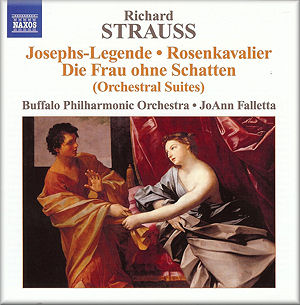 |
 |
|


alternatively
CD: AmazonUK
AmazonUS
Download: Classicsonline
|
Richard STRAUSS
(1864-1949)
Suite from Der Rosenkavalier, TrV 227d (1911) [23:47]
Symphonic Fantasy on Die Frau ohne Schatten, TrV 234a (1946)
[20:41]
Symphonic Fragment from Josephs-Legende, TrV 231a (1947) [23:49]
 Buffalo
Philharmonic Orchestra/JoAnn Falletta Buffalo
Philharmonic Orchestra/JoAnn Falletta
rec. Kleinhans Music Hall, Buffalo, USA, 31 March – 1 April 2008
 NAXOS 8.572041 [68:34]
NAXOS 8.572041 [68:34]  |
|
|
While the Rosenkavalier suite will no doubt attract
most purchasers, the other two works – written by Strauss in his last years in an attempt to popularise two of his earlier compositions that he considered unduly overlooked – are,
in many ways, of even greater interest.
Diaghilev’s ballet Josephs-Legende, for which
Strauss’s music had been originally written, proved to be a
flop on two counts. In the first place it had an over-inflated
storyline into which the librettist - bon viveur, dilettante
and man about town Count Harry Kessler - had gleefully inserted
a mass of sublimated and not-so-sublimated S&M and homoerotic
themes. And, fatally, its first run in 1914 was torpedoed by
the wave of virulently anti-German sentiment that swept France
and its allied nations shortly after the outbreak of the First
World War in August that year.
That full original ballet score has had something of a revival in recent years with a very fine Deutsche Grammophon recording from Giuseppe Sinopoli and the Staatskapelle Dresden in the year 2000 (see here)
and an outstanding Channel Classics version from Iván Fischer’s Budapest Festival Orchestra seven years later. Even better, it is now possible to buy Deutsche Grammophon’s DVD reissue of John Neumeier’s 1970s Vienna production of the staged ballet that, while abandoning many of the more elaborate – not to say downright camp – of Kessler’s
ideas kept largely to the spirit of the piece.
But if more than an hour of Strauss at his lusciously ripest
is too much for you – as Strauss himself, busily reworking the score amidst the very different atmosphere of austerity in post-World War II Berlin, obviously thought might be the case for some – then maybe the cleverly abbreviated “symphonic fragment” is
for you. It has occasionally been recorded in the past, though,
significantly, that was often only when it was impossible not to
do so - in, for instance, Kempe’s well-known complete traversal of Strauss’s orchestral works or in Koch Schwann’s
CD series The Unknown Richard Strauss. But JoAnn Falletta’s new Naxos disc easily trumps those, and not only for the superb quality of recorded sound which is so important in dense, colourful late Romantic scores such as this one, virtually a Cecil B. DeMille epic set to music. Her interpretation is also spot on, combining the requisite sensuality, spectacle and tenderness as appropriate to the clearly delineated elements of the story. It carries the listener on inexorably to the drama’s stirring climax of Joseph’s
celestial transfiguration.
Because the music for Josephs-Legende was written for
dance, it has, perhaps, a more immediate appeal than that for
Strauss’s 1919 opera Die Frau ohne Schatten. Nevertheless,
in his final years Strauss also believed that he could successfully
popularise the latter by reworking themes from the latter into
a shorter and purely orchestral work. For this abbreviation,
the composer was far more selective in his editing than he
was to be the following year with the Diaghilev ballet. Here
he jettisoned much of the Emperor’s and Empress’s music, cherry-picking instead themes associated with the opera’s other couple, the dyer and his wife, with whom, it seems, he himself felt a far greater personal empathy. As such, it becomes impossible to follow the consistent story of the opera through the music, which presumably explains why Strauss instead regarded the piece as a more generally conceived “symphonic fantasy”. Once again, though, there is some utterly glorious music to be heard – and
although it is not quite so enjoyably over the top as the Josephs-Legende score,
its darker colours are perhaps only to be expected in music
penned in the catastrophic aftermath of 1918’s defeat and demoralisation
rather than in the headily hedonistic pre-war era. This new
account is once more a very fine one, though the jury must
remain out on whether it will succeed in its acid test of driving
listeners to explore Die Frau ohne Schatten itself,
arguably one of the composer’s more flawed and “difficult” stage works (Michael Kennedy has described it as Strauss’s “most symbolic and intellectual creation, a mixture of fairy tale, magic and Freudian psychology”,
which gives a broad hint as to why it may never have attracted
at least the matinee audiences.)
There is no such difficulty about Der Rosenkavalier,
which, ever since its composition exactly a century ago, has
been hugely popular. The suite presented here was written immediately
after the opera’s initial success and is less a popularising reworking – as in the other two works on this disc – than
a simply glorious potpourri of its most popular melodies.
In his unusually chatty and enjoyable booklet notes, Edward
Yadzinsky puts it very well: “All the renditions are centered
around the florid waltzes... And in every setting, the music
resounds with lusty tunes, swaggering rhythms, gorgeous harmonies
and a scintillating orchestration, all in tribute to the great
Viennese tradition. Wunderbar...!”
Recorded in the fabulously clear acoustics of their base at Kleinhans Music Hall, the Buffalo Philharmonic has a fine pedigree, with past Music Directors including William Steinberg (1945-1952), Josef Krips (1954-1962), Michael Tilson Thomas (1971-1979) and Semyon Bychkov (1985-1989). JoAnn Falletta (1999 - present) is now not only the first woman but the longest serving incumbent in the post and this hugely enjoyable and bargain-priced disc indicates that she need fear no comparison with any of her illustrious predecessors.
Rob Maynard
|
|
|















